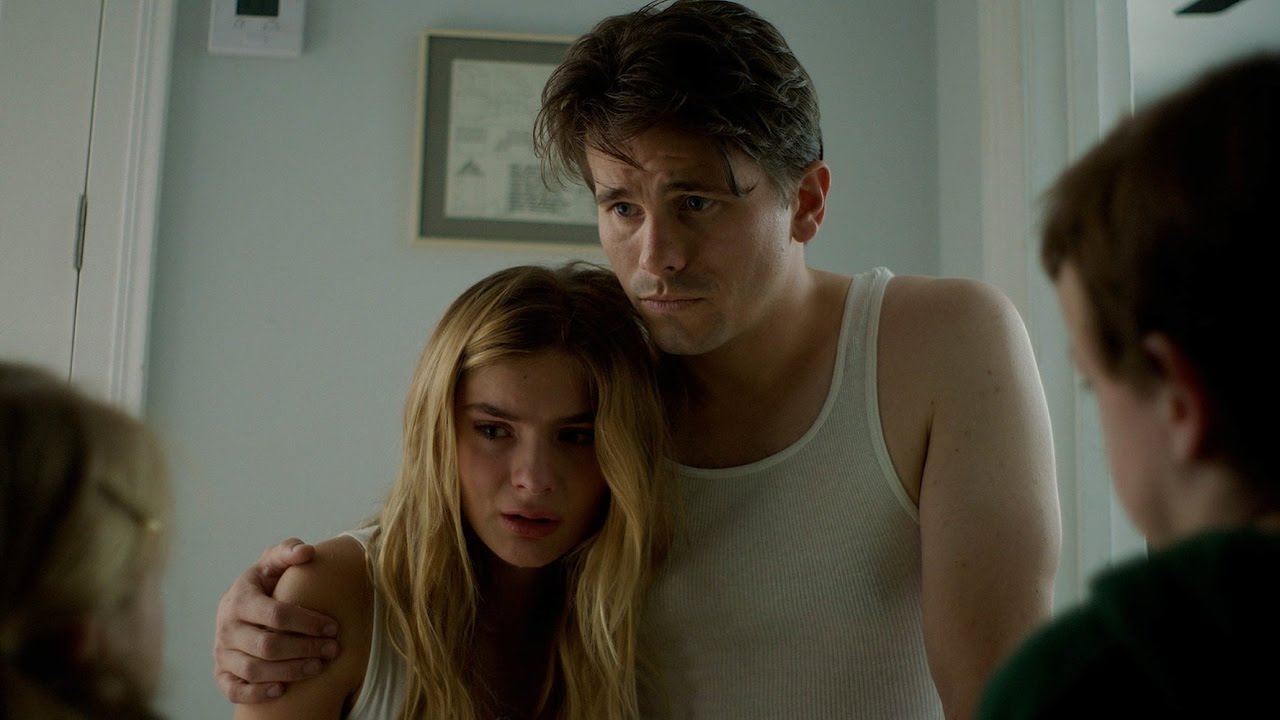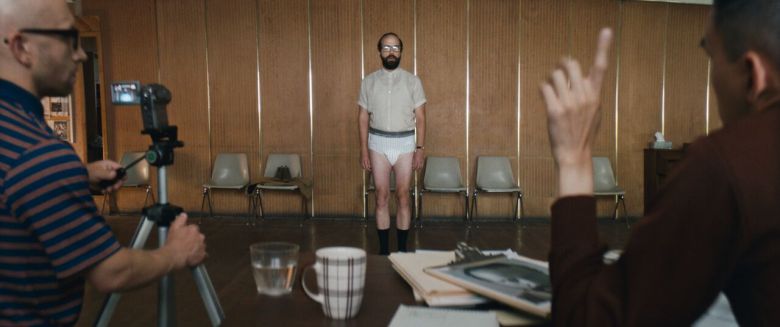Sundance NEXT Fest 2017
We had the honor of being invited to cover Sundance NEXT Fest 2017! Read below to see what we thought of the festival’s selections.

BITCH
Director: Marianna Palka
Genre: Drama
In a film world plagued by whitewashed token feminism, BITCH takes a pitch-dark look at those aspects of womanhood most other films wouldn’t dare to touch. Childfree lifestyles are becoming more accepted, but what does it look like when a woman truly hates her children and domestic life—and is she a “bitch” for it? Marianna Palka is truly a tour-de-force as writer, director, and star. Not every filmmaker would write themselves a role like this one, and it speaks volumes about the strength of her vision. BITCH is also quite the technical achievement. Its startling editing and eerie sound design create constant anxiety, even in the film’s calmer moments. While I personally would have preferred more focus on Palka’s character, Jason Ritter adds a comedic palate cleanser to this incredibly tense film. Ritter plays a workaholic absentee dad straight out of a ’90s family comedy, but with the great misfortune of being dropped smack into a horror film. He’s a vessel for BITCH’s tonal weirdness—which is one of the true highlights of this incredibly unique film. Is it a romantic comedy? Is it a family romp? A horror film? A dark drama? In short, yes. Palka is no stranger to the scene. You may recognize her from GLOW or that episode of GIRLS where Hannah resists giving up her phone at a women’s wellness retreat. However, BITCH represents a clarity of vision and cinematic courage that—I hope—will bring Palka’s career to the next level. [Kate Brogden]

DINA
Directors: Antonio Santini and Dan Sickles
Genre: Documentary
In Antonio Santini and Dan Sickles’s newest documentary, we meet Dina, a protagonist we rarely get the chance to meet. Diagnosed with Asperger’s, Dina lives on her own in a small apartment and is preparing for her imminent marriage to Scott, a Walmart greeter who’s also on the autism spectrum. The film takes place in the week before and several days after the wedding ceremony (which has a butterfly theme and takes place in the back of a restaurant), and follows the struggles that the couple faces in learning to live together and communicate with one another effectively, just like every other couple. The hardest part for Dina is Scott’s lack of physical affection and apparent fear about sex. Romantic, music-loving Scott croons “Before The Next Teardrop Falls” on his first trip to the ocean and frequently helps to comfort his fiancee, but continuously faces difficulty with cuddling or touching, and is obviously uncomfortable when Dina presents him with Alex Comfort’s sex manual “The Joy of Sex” as a clear hint. And that’s when the movie works best: in its subtext and through the couple’s subtle ways of expressing themselves and their emotions to the people in their lives. Unfortunately, these moments come pretty far and few between, with the between being the more mundane moments of any wedding prep. Luckily, the characters are charming and funny and sympathetic, and it’s enjoyable just to watch them stumble as they find their way. [Hayley Bensmiller]

GENTE-FIED
Creator: Marvin Lemus
Genre: Drama
Welcome to the age of anthology shows. What better way to explore the sociological wonders of community through art? Never mind the TWILIGHT ZONE-style terror from BLACK MIRROR, and consider the framework’s new existence in down-to Earth-human dramas. From shows that experiment in the form with side character-centric episodes like ATLANTA and ANIMALS, to the constantly wandering and weaving tales of EASY and HIGH MAINTENANCE, odd homo sapiens clashing against one another are being put in display in ways that rival most entertaining nature documentaries, sans narration. Yet the structure and mood set by the purest pieces of this kind are often most potent by working with specificity. This is where GENTE-FIED succeeds and thrives as a web series.
The context of GENTE-FIED’s content is inspired and relatable, and delivered in a deceptively simple and unique way. There aren’t many blatant stylistic frills that distract from the core values at hand, but it chugs along at its own super personality-driven pace. The show’s pulse thumps with pride and reverence for its subject: people within the Mexican population of modern day southern California as they struggle and learn to accept the changing tides of the world, while still managing to be true to their background and themselves. These episodes are endlessly musical, and filled with lively banter reminiscent of films like DO THE RIGHT THING, observing social science at its rawest. The cute, yet biting, writing pulls focus on the dichotomy of placing cultural identity right up against elements of the new age: social media, the difficulty of finding stable living, more open-minded views on gender and sexuality, and especially the battle against cultural appropriation whilst simultaneously trying to find clarity in sharing one’s world. Characters worry about “how” Mexican they are, and struggle with the adversity thrust upon their communities. These sincere portraits entertain as much as they convey and inspire open-hearted empathy.
Creator Marvin Lemus and crew bring to the front complicated, heartfelt storytelling that justifies the purity of its form and the strength of its inherent medium. These are the kinds of stories that need to be told and shared these days; stories that help build bridges, and act as mirrors to audiences so very in need of proper representation. GENTE-FIED is a bold and proud first step in this new wave of filmmaking and filmmakers. Here’s hoping it isn’t the only of its kind for the world to come. Artists, take note and stand up alongside it. [Rocky Pajarito]

GOLDEN EXITS
Director: Alex Ross Perry
Genre: Drama
New York City’s resident acid-tongued auteur (Alex Ross Perry, to specify) returns with a picture that utilizes many of the same factors that made his breakout, LISTEN UP PHILIP, one of 2014’s highlights: Jason Schwartzman, cruel breakdowns of the New York City intelligentsia, and an ethnically cleansed cast. Following the effects of a new-in-town Australian beauty, played marvelously by Emily Browning, on two sets of Brooklyn couples, Ross Perry has made his very own AND GOD CREATED WOMAN…, without the Bardot and subbing in the fear of the all-powerful feminine form with that of—the foreign one? Browning’s mentoring by a vibrant Mary-Louise Parker, an absolute scene-stealer, cements what GOLDEN EXITS strives to argue for its first half: women are unbridled, invincible nuclear powerhouses who are capable of facing anyone and anything. Unfortunately, the second half may argue that the power wears off as soon as they turn 40, in which case they’re just as useless as men of any age.
The camera invades each character’s personal sphere, revealing the tortuous emotional road maps in the wrinkles of their worn-down demeanors. Emily Browning’s scenes are puzzling: the way we focus on her, each dastardly chosen word meant to provoke her male prey, hints at a devious arc. What is up her sleeve? Why did this warrant a movie? With GOLDEN EXITS, Perry continues to translate his musings into curt, 90-ish minute features instead of focused, 140-character drafts. The filmmaking is staid. Aesthetically pleasing as VSCO snapshots, sure, but far less engrossing as base visual storytelling. Perry seems not to have stories to tell, but a singular voice to shout (or rather, to hiss with). Perhaps he acknowledges that catering to forgiving, ever-adoring festival crowds is preferable to Twitter’s daily humblings. [Kevin Cookman]

GOOK
Director: Justin Chon
Genre: Drama
This is one of those messy, charming, imperfect films that you hope to see at a place like Sundance and which needs to be made more often. GOOK is set in Los Angeles during the 1992 Rodney King riots, but told from the perspective of two Korean brothers attempting to keep their father’s shoe store running even as racial tensions threaten to drive them out of their neighborhood. Justin Chon’s second feature-length film was made on an incredibly narrow budget and clearly does the absolute most that it can with its limited means. Yes, there are moments in this film that don’t quite hold together—scenes when the audience is left scrambling to make sense of what just happened when a combination of confusing directing, writing, and editing feel rushed, when they could’ve been executed more meticulously. In the end, however, this ultimately isn’t very important, because this charming and dynamic cast delivers so many knockout scenes again and again. Chon also deserves a huge amount of credit for walking such a tonal tightrope throughout this film; a lesser director would have simply left his audience to drown in the sorrow of this incredibly dark day. Instead, Chon finds moments of humanity and humor at even the relative low points of his narrative, until the incredibly tragic end. What’s more, Chon portrays a Los Angeles that is rarely seen. Not exactly gang-torn, but far from Beverly Hills, the film acts as a reminder of the minutiae of the racial and class politics that define this sprawling city. While it’s not quite DO THE RIGHT THING or LA HAINE, this kind of narrative deserves to be seen and experienced more frequently by all audiences. [Carter Moon]

L.A. TIMES
Director: Michelle Morgan
Genre: Comedy
Michelle Morgan undoubtedly has a very strong, unique voice. While L.A. TIMES may not be her breakthrough film, it is still an entertaining showcase of an important up-and-coming filmmaker to pay attention to. The best way of describing her distinct style would be somewhere between Woody Allen and Lena Dunham. Depending on who you are, that will either sound like an interesting mix, or a complete shitstorm. L.A. TIMES is a film about a group of 30-something creative types going through the trials and tribulations of advancing into the next step of their lives. An important thing to note is that the “quirk” factor is turned up to 11 for the full duration of the film. This is going to turn some people off. Morgan—who writes, directs, and stars—may have been given a bit too much creative control. My biggest criticism of the film is that all of the characters talk and act like Morgan. They all say exactly what they’re feeling at all times, they’re all feeling anxious over newfound success, and they all have commitment issues. Even The Lonely Island’s Jorma Tacone plays against type as an Alvy Singer-type of character. It feels like Morgan was trying to make the next ANNIE HALL, and may have fallen short. But the end result is nonetheless a very entertaining movie. I predict that within a few years, her following will grow exponentially as she goes on to hone her craft. L.A. TIMES may not represent an artist at the peak of her game, but it hits more often than it misses, and in the end it’s a very charming and original film. [Eden Bailey]

LEMON
Director: Janicza Bravo
Genre: Dark Comedy
Janicza Bravo is one of the more peculiar, yet most important, voices in modern American comedy. Having directed a crucial episode of FX’s ATLANTA and made some truly bizarre and bold short films for groups like JASH and Nowness, she’s been primed and ready to make her feature debut for some years now. Simultaneously, her partner Brett Gelman, a unique comedian and presence in his own right, has been ready for a vehicle of his own. Stars aligned, Bravo and Gelman finally get their moment in the spotlight, and decide to make LEMON, a comedy rooted in sensations of disconnection and existential misery. It’s an abrasive, inspired effort clashing post Tim and Eric-new wave alt-comedy with the poetic absurdity of Luis Buñuel, and the devastation of Michael Haneke. You know, another one of those.
For one, it’s refreshing to have the voices of women of color like Bravo in the comedy scene, making such unique and personal art. LEMON could have started and ended at being an awkward cringe comedy, but it chugs along like the dense and intense oddball train it is, laced with observations on the ideas of success and happiness, family influence, and race relations. It’s cryptic and obscure, with a bite that produces belly laughs often difficult to understand. Bravo has no qualms with making double-underlined-uncomfortable art, and Gelman acts as a finely tuned delivery mechanism in lock-step. He provides calculated lunacy to the role, coming off simultaneously as sympathetic and a demented step child of THE KING OF COMEDY’S Rupert Pupkin (yes, that rough). The way and style with which LEMON purely exists risks alienation, but often scores points instead for being unlike every other modern comedy these days, harkening back to older, weirder films of the ’70s and beyond, and even finding kinship with modern art-house thrillers.
LEMON may not take off like a film it shares kinship with, NAPOLEON DYNAMITE, but it leaves a weird stain that cannot, and should not, be ignored in the independent film and comedy worlds. Bless the artists for not feeling the need to make art that would be blatantly friendlier, or easier to take in for mainstream audiences. They deserve to work with fellow cinematic daredevils, pushing comedy to places it has not gone, or hasn’t been in a while. As pioneers and leaders of sorts, Janicza Bravo and Brett Gelman prove daring and confident ranking with LEMON, a classic whose cult will be feverish and passionate. [Rocky Pajarito]



